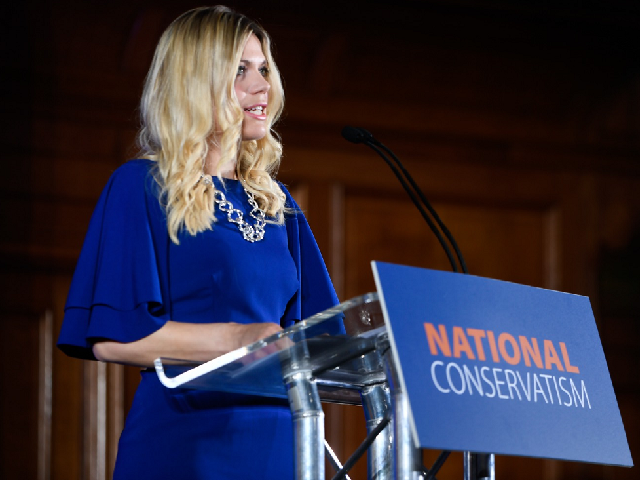It is not Communist China, Russia, or even the supposed climate crisis, but rather the plummeting birthrates that represents the greatest single threat to Western society, Conservative MP Miriam Cates warned.
Delivering a speech at the National Conservatism Conference in London on Monday, Tory MP Miriam Cates argued that the most important issue facing the West is the “failure to deliver” babies, as forces such as “cultural Marxism” and a lack of pro-family government policies disincentivises the younger generations from starting families at replacement-rate levels.
None of our philosophical musings or policy proposals will amount to anything unless we address one overarching threat.
It's not neo-Marxism, inflation, or taxation. It's one critical outcome that liberal individualism has failed to deliver: babies.
-MP Miriam Cates #NatConUK pic.twitter.com/nUN22e4z6o
— National Conservatism (@NatConTalk) May 15, 2023
“None of our philosophical musings or policy proposals will amount to anything long-lasting unless we address the one overarching threat to British conservatism, and indeed to the whole of Western society. No it’s not climate change, it’s not Russia or China or Iran, it’s not the Neo-Marxist ideology that has so weakened our institutions, it’s not inflation, or taxation, or poor productivity. There is one critical outcome that liberal individualism has completely failed to deliver and that is babies,” Cates told the crowd at the Emmanuel Centre in Westminster.
The Member of Parliament, who has become a leading voice — if not one of the only voices — within the Conservative Party for pro-family policies, went on to say that it is imperative to give a positive vision to young people, saying that the hope for the future has been overpowered by the forces of cultural Marxism, which she said according to The Guardian is “systematically destroying our children’s souls.”
Cates argued that a broader societal shift is required to foster the environment needed to encourage families to prosper, saying that while important, home ownership and employment are not the only things that matter in the equation.
‘So What?’ Demographic Collapse of Native Britons Shrugged Off by Top Tory https://t.co/jffpcDEA5A
— Breitbart London (@BreitbartLondon) December 1, 2022
“When culture, schools and universities openly teach that our country is racist, our heroes are villains, humanity is killing the Earth, you are what you desire, diversity is theology, boundaries are tyranny and self-restraint is oppression, is it any wonder that mental health conditions, self-harm and suicide, and epidemic levels of anxiety and confusion characterise the emerging generation?” Cates questioned.
Nevertheless, the Tory MP went on to criticise the Conservative government for failing to deliver pro-family policies. One of the chief complaints among pro-family advocates has been how the state taxes families versus individuals: the government only taxes individuals, not family units, meaning that families reliant upon a single income of £50,000 will take home less money than two working parents on salaries of £25,000, thereby incentivising both partners to work rather than stay at home with children.
Rather than attempting to help families during the cost of living crisis, Prime Minister Sunak’s government has instead introduced policies dubbed as “stealth taxes” in which future tax band thresholds are frozen. This will likely see thousands of middle-class families be placed in artificially high tax brackets as their wages rise due to inflation, which the freeze doesn’t take into account. To add insult to injury, family benefit programmes were also frozen, meaning that the same families will likely be priced out of the government programmes as their paychecks increase along with inflation.
Priti Patel’s ‘Economically Inactive’ Comments Betray UK Govt’s Hostility to Traditional Family https://t.co/NsSuUcYD3Q
— Breitbart London (@BreitbartLondon) February 20, 2020
Cates went on to criticise the introduction of no-fault divorces, with the nominally Conservative government paving the way for increased divorces with the Divorce, Dissolution and Separation Bill, which came into force in April of last year. While official figures have yet to be released, projections from the PwC professional services firm predicted that this year will see a 23 per cent rise in divorces this year as a result of the legislation.
During her speech, the MP went on to link the expansion of higher education to the devaluing of family life, saying: “Many graduates are saddled with debt, and so are unable to afford to buy a house and start a family.
“Spending so much time and money on education also makes it much more difficult, particularly for women, to decide when is a good time to pause and have children.”
Over the past five decades, a series of policies have incentives more women to enter into the workforce rather than staying home to raise children, with 72.2 per cent of women aged 16 to 64-years-old employed now compared to 52.7 per cent in 1971.
This has coincided with increases in women delaying marriage and indeed having children, with 2021 marking the first time in recorded history that the majority of women remained childless past their 30th birthday. While there have been declines seen in the brith rate of native British women, a record high of 29.3 per cent of live births were to foreign women in 2020.
Anti-Family Tories Unveil Plan to See Million More Women Enter Workforcehttps://t.co/Gj0Q8TCsZZ
— Breitbart London (@BreitbartLondon) March 15, 2023
Follow Kurt Zindulka on Twitter here @KurtZindulka

COMMENTS
Please let us know if you're having issues with commenting.